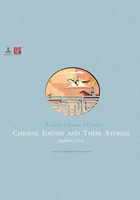
画虎类犬 (huà hǔ lèi quǎn)
Be Tiger or Dog
In many Chinese sayings, the tiger represents the powerful, the monarch or the upper class, while the dog is deemed ignoble or riffraff. The popular idiom Hua Hu Lei Quan, or “trying to draw a tiger, but ending up with the likeness of a dog” is a good example.
The expression is derived from a letter written by Ma Yuan, a well-known eloquent scholar who lived during the Eastern Han Dynasty (25-220 AD).
Because of his knowledge and eloquence, Ma was often summoned by the imperial court to discuss state affairs in front of the emperor. Two of Ma’s nephews, Ma Yan and Ma Dun, admired their uncle’s achievements and decided to follow his example and become elocutionists of his stature.
However, instead of discussing serious questions, the two young men were often heard passing judgment upon other’s behaviors, appearances and personalities.
Learning this, Ma was concerned that his nephews were heading in the wrong direction in their pursuit of careers as elocutionists. So, he wrote a letter, hoping to persuade them to avoid passing judgment on others.
In the letter, Ma told his nephews that he respected two scholars in his life. One was a modest, kind-hearted and sensible man who was highly regarded by his peers although he didn’t hold a high position in the court. The other was a chivalrous and outgoing man who could make friends with both good and bad guys.
Ma encouraged the two young men to regard the former as their role model and told them to refrain from imitating the latter.
“By learning from the former, you can’t go too much wrong,” Ma said. “Even if you fail to obtain his many good traits, you may at least become sensible persons.

“But if you want to imitate the latter, you could end up in the very wrong direction as his behavior is difficult to copy. This is just like someone trying to draw a tiger, but ending up with the likeness of a dog.”
Since the letter was made public, it has become a must-read for nearly all Chinese scholars and the phrase Hua Hu Lei Quan has become a popular idiom.
Today, the saying is frequently used to describe poor imitations and to persuade people not to reach for what is beyond their grasp.